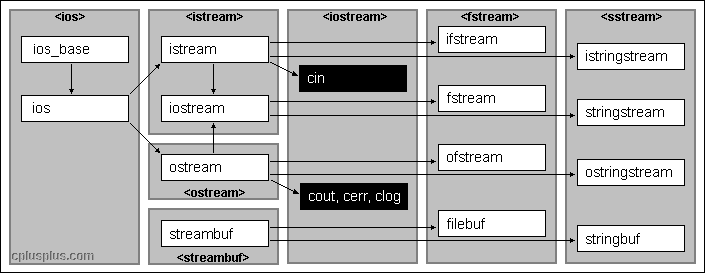[C/C++標準庫]_[中級]_[使用stringstream作為記憶體流讀取]
阿新 • • 發佈:2019-02-01
場景:
1. C++標準string是可以支援unsigned char* 位元組資料的,只要使用以下兩個函式就可以新增即使是0x0的資料.
string& append( const char* str, size_type num );
string( const char* str, size_type length );
2.stringstream可作為記憶體流來使用,比如再需要處理檔案,過濾內容後再輸出到另一個檔案裡。記憶體流不需要操作檔案指標,比較省時間和io.
流向: ifstream(FILE*)->ostringstream->istringstream->ofstream(FILE*)
測試程式碼: test_stream.cpp
#include <locale> #include <iostream> #include <stdlib.h> #include <string> #include <fstream> #include <string.h> #include <sstream> using namespace std; void TestMemoryStream() { unsigned char buf[] = {0xf1,0x0,0xfe,0x00}; string str((char*)buf,4); size_t str_size = str.size(); cout << "str_size: " << str_size << endl; cout << (int)str[1] << endl; istringstream iss(str,ios_base::in); iss.seekg(0,ios_base::beg); char buffer[4]; memset(buffer,0,sizeof(buffer)); iss.read(buffer,1); cout << (int)(buffer[0] & 0xff) << endl; iss.seekg(0,ios_base::end); size_t last_pos = iss.tellg(); cout << "stream size: " << last_pos << endl; } //http://www.cplusplus.com/reference/ios/ int main(int argc, char const *argv[]) { //1.測試記憶體流. TestMemoryStream(); //2.檔案流->記憶體流->檔案流. //ifstream->ostringstream->istringstream->ofstream cout << argv[0] << endl; ifstream is(argv[0],ios_base::binary); ostringstream oss(ios_base::binary); streamsize ss_size = 0; char buf[65]; cout << "begin read is" << endl; while(!is.eof()) { is.read(buf,64); ss_size = is.gcount(); if(ss_size) { oss.write(buf,ss_size); } } cout << "end read is" << endl; istringstream iss(oss.str(),ios_base::binary); iss.seekg(0,ios_base::beg); string str_path(argv[0]); str_path.append(".bak"); ofstream ioo(str_path.c_str(),ios_base::binary); cout << "start read iss" << endl; while(!iss.eof()) { iss.read(buf,64); ss_size = iss.gcount(); if(ss_size) { ioo.write(buf,ss_size); } } cout << "end read iss" << endl; return 0; }
輸出:
C:\Users\apple\Desktop>test_ifstream.exe
str_size: 4
0
241
stream size: 4
test_ifstream.exe
begin read is
end read is
start read iss
end read iss
